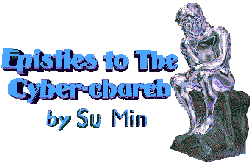
From: Su Min
Friday 8th November 1996.
Dearly Beloved,
as a brother, I know that very often the wrong brother gets blamed!
This time, in my recent text "Strangely Warmed" (5th November 1996), I blamed Charles Wesley for
finding the Methodist movement.
I was wrong. He lost it.
It was his brother John Wesley who found it.
So it was John Wesley who went to church on Aldersgate day, and heard a sermon preached, quoting a
preface to Luther written by Romans, and his bottom was strangely warmed.....
Before I get more confused I will stop.
Here is some info about Methodism that I got from the net..
"Arminianism" is an important component of the Methodist tradition. and we have a strong legacy from
the Moravians.
Su Min
]]]]]]]]]]]]]]]]]]]]]]]]]]]]]]]]]]
Methodism
David Cody, Associate Professor of English, Hartwick College
[M]ethodism was a religious movement, led by Charles and John Wesley and by George Whitefield,
which originated as a reaction against the apathy and the emphasis on logic and reason that characterised
the Anglican Church in the early eighteenth century.
The term was originally applied to a religious society which was established at Oxford University in 1729
by Whitefield and the Wesley brothers (nicknamed the "Holy Club, “ its members were pious young men
who, in order to promote piety and morality, observed strict rules of fasting and prayer).
Subsequently, it was applied to a variety of evangelical religious groups who took their original
inspiration from the movement's founders, whose views on certain
Subjects were very different.
Whitefield, for example, accepted many traditional Calvinistic views, while the Wesleys tended toward
Arminianism and rejected, in particular, the Calvinist doctrine of predestination, insisting that if a man
could acquire through the intercession of the Holy Ghost the conviction that Christ loved him and had
sacrificed himself for him, his sins would be forgiven.
Conservative members of the Church of England in the mid-eighteenth century found the Methodist
emphasis on private revelation and religious enthusiasm repugnant, but that same enthusiasm would
become a central aspect of nineteenth-century evangelicalism.
John Wesley, the central figure in the Methodist movement, was a man of considerable intellect and
enormous energy. During his lifetime he travelled, mostly on horseback, over a quarter of a million miles,
and preached over forty thousand sermons, many in the open air, before audiences which were frequently
hostile. He built up an enormous following, however, among the labouring poor of the new industrial
areas, whom the established Church of England had tended to neglect, and by the late eighteenth century
there were hundreds of Methodist chapels, presided over by itinerant lay preachers. Methodism was very
much a religion of the poor, and had a great deal to do with a revolution in English religion which was as
radical in its effect, in its way, as was the Industrial Revolution itself.
The social and political impact which the movement exerted upon its main constituency was, however,
rather ambiguous. Wesley, who advocated a strict, even brutal, approach to raising children, was
politically and socially conservative, and many Wesleyan leaders supported child labour and opposed the
teaching of writing in Sunday Schools. On the other hand, other Methodists were much more openly
democratic and concerned with working-class issues, taking an active role in the development of trade
unions and in radical political activities. The movement remained officially within the Church of
England, on however precarious a basis, until after John Wesley's death in 1791, after which it splintered
into a number of factions of various sizes which were not reintegrated until the united Methodist Church
of Great Britain was established in 1932.
====================
If you want more info, surf the web and look for "Methodist" or "John Wesley".
Subject: Oops: wrong brother
For any comments or enquiries please write to Dr. Lim Su Min
| Back to Antioch's Well | Back to Antioch's Home Page |
![]()